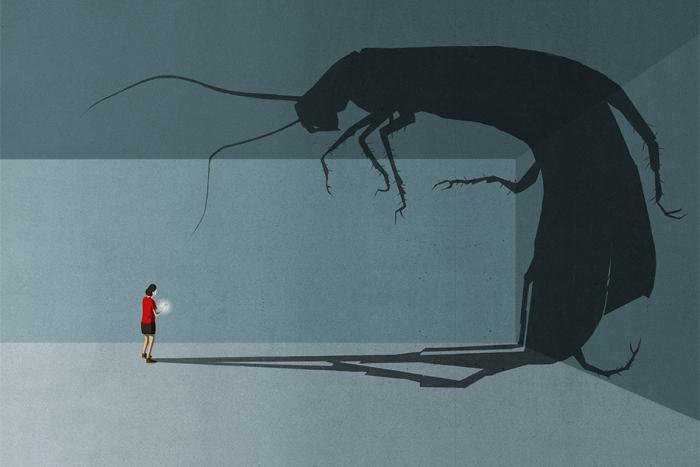FLOOR PLAN
Why is she wearing heels inside the house? This was the first thing I thought when I entered that enormous apartment, sometime between 1998 and 1999. I would only register all the details of the floor plan afterwards, because I could not take my eyes off those long pink legs. My ears, they only registered the click-clack of the high heels—first on the marble entryway, then on the pristine floorboards of the living room, smelling like wax and shining in the clear light coming through a gigantic window that separated the room from the terrace, next in the enormous hallway, and lastly on the kitchen’s ceramic tile floor.
Mãe only wore heels when she went out with my pai. At home we wore flip-flops or nothing. It’s so nice to not wear shoes, to stand barefoot on the ground. I’d seen rich people wear high heels inside the house only on soap operas, and that’s just what this house looked like: a movie set. There was something artificial about it that I didn’t know how to place.
The woman’s walk was rushed and uptight, making that sound even more irritating. I was so young and I couldn’t cast my gaze much higher than her legs, which stopped moving near the refrigerator, but Mãe and I had to keep going ahead up to a white door, in the service area.
When the door opened, Mãe said in a low voice: “Don’t come out until I come back!” And she closed the door, leaving me there, in the dark. Terror overtook me. It wasn’t loneliness or even fear of the dark. It was something bigger. What I felt sitting there on the narrow bed in that room still doesn’t have a name.
For me it lasted an eternity, but it wasn’t more than five minutes. It was so hot, one of those days that easily pass one hundred degrees, and Mãe came running back to turn on the light and the fan. She was so breathless and terrified that she practically threw me back into the room, took a few toys we had brought from the backpack, turned the TV to some cartoon, repeated that I shouldn’t come out under any circumstances, and went rushing back to talk to the woman of the house. She had been working there only a short time, and I was making my first appearance in the elegant luxury condo that took up an entire floor in one of the fanciest neighbourhoods in the city.
I put my ear against the door to try to hear what they were saying, but I could only make out chopped sentences. “Why didn’t you come in through the back? Am I the one who has to open the door for you? It’s complicated this way, Eunice . . .” “It’s just for today, Ms. Lúcia, it’s just . . .” “. . . but I told you that . . .”
My grandmother wasn’t well and couldn’t take care of me. There was no other way. I would need to stay with my mother at work for about four days, then she would switch with the other maid and get time off. Ms. Lúcia was never without a maid in the house. Mamãe was sad . . . She had cried the whole way on the train, running her fingers over the tiny white beads of a rosary hidden in her purse. She got even more worked up when she reached the bottom of the bag, the inner and outer pockets, and realized she’d forgotten the keys to the service area door.
“Hail Holy Queen, Mother of Mercy, our life, our sweetness and our hope!” she murmured.
The packed train was a kind of safe harbour. Even while standing and tightly packed, people could collapse in exhaustion. In the cars’ hard and loud rumbling, they immersed themselves in their misfortunes or their small joys. Leaning against the support rails, they flirted, they confided, they made lifelong friends, and enemies too. People could buy everything on the train: batteries, flashlights, umbrellas, chocolate, candy, dishrags, dolls, toy cars, the newest electronic gadget. I loved it!
There was pagode, samba, sertanejo, funk, gospel music. There was also assault, abuse, theft, accidents, a man sitting with his tired head in his hands . . . But he relaxes on the train because there’s no heat from the cops. And the cop rests. And the thief rests too. There’s a chance that the former will apologize for stepping on the latter’s foot. Everybody is everybody on the train, and everybody is nobody.
Time is funny when we’re children. Afterwards, I understood that I hadn’t spent even an hour in that apartment, but for me an hour was the same as a whole day. Mamãe was very careful not to bother the woman of the house with my presence, and every once in a while she came to the little-room to see me. One half of her very black face appeared through the door and spied on me. Just her big eyes, bright, beautiful, black, and her pristine head wrap poking in and out, in and out . . .
Thinking about it today, after so many years, I could be offended, after all. Could it be that she was more worried about a grown woman than about me? In a way, she thought I knew how to take care of myself better than Ms. Lúcia could take care of herself. As years passed, these “eternal children” became intolerable to me, as if I were a kindergarten teacher for the spawn of demons.
Then the cookies and water we’d brought in the backpack ran out. I got thirsty, but I couldn’t leave the little-room. I got hungry, but I couldn’t leave the little-room. I had to go pee, but . . . I discovered a tiny bathroom behind the other white door: a toilet, a shower that was nearly over the toilet, opposite a sink with a mirror on the wall above it. Between the mirror and the sink, a shelf with a small container, a tube of toothpaste and toothbrush inside. Everything in miniature.
When having a maid who sleeps on-site became expensive and not in very good taste, real estate agents called this part of the house a “reversible room,” anything to not call the little-room a little-room or what it actually was: a place for servants, maids, nannies, domestics, babysitters, employees. All these names they gave and give today to someone who is “almost family.” A place where they would be in range of an order, a look, within arm’s reach . . . All the time, twenty-four hours a day.
Mamãe finally came all the way into the room. She came to bring me food and a cup of orange juice. She took off the head wrap, washed her face and hands in the little sink of the little-bathroom of the little-room. She made the sign of the cross to her little saints on the improvised bedside table. Even the saints were small! We prayed to them every night. “Com Deus me deito, com Deus me levanto, Nossa Senhora nos cubra com seu manto.”
We heard a light knock on the door. It was a young girl dressed in white asking to use the bathroom. Mãe let her in. I started to laugh at the cartoon that was running on TV. She was wide-eyed, turning her head from side to side, rushed, as if we were being watched or hiding from the police. She put her pointer finger to her mouth and made a loud ssssshhhhhh. I couldn’t give any sign that I breathed, or got hungry, or thirsty, or needed to pee, or laugh or exist, in the little-room?
We heard steps from the kitchen. This time she was the one who pressed her ear to the door.
“Don’t start with this, Lúcia . . .”
“You don’t care, do you, Tiago?”
“I care.”
“The treatments are painful, it’s all painful! And this insistence that it’s not working makes me feel like I’m only half a woman.”
“For God’s sake, Lúcia, I . . . Look, let’s go back to the living room? Then we’ll talk. It’s not good to leave our guests to come out here and argue. Where’s Eunice?”
He raised his voice, hoping my mother would hear and show up to interrupt the conversation. Ms. Lúcia spoke louder still.
“You, in the pool, so happy playing with Bruninho . . . And what was all that talk about children right in front of me?”
“He’s our nephew! Not everything is about you, Lúcia.”
“You want to throw it in my face, how badly you want to be a father, knowing I’ll never be able to make that happen?”
The two fell silent. Ms. Lúcia started to cry softly. My mother understood the pause as a signal and went to the kitchen. They said other things, but what I’d picked up on was that another kid was in the house . . . and that there was a pool! In the mega-heat, it would be so good to play in the water.
The couple went back to their guests, who were old friends and some relatives. It was Ms. Lúcia’s sister Helena’s birthday, and it was her child who was in the apartment besides me.
Mr. Tiago was very excited, singing songs picked especially for the party. He loved Brazilian pop music. He had good taste. They were all listening to Cartola. My mother entered the kitchen carrying a tray full of dirty cups and empty bottles. They all started to dance and sing and laugh . . . I think they were a bit tipsy.
I thought it wouldn’t do any harm to go out and look for my possible friend. Who would mind? I grabbed a doll, a small ball, and I started to walk. I passed the service area, the kitchen, the dinner table, through the long hall, past the half-open doors to the study, past the guest room, the master bedroom . . . What a big house! I saw Ms. Lúcia, who had stayed in her room for a while after her talk with her husband in the kitchen. She was drying her face. I left quickly, before I was seen, because she was already heading back to the living room again as if nothing at all had happened and without ever taking off her heels.
I entered the living room slowly, sneaking and hiding in the corners. I passed the long glass door at last . . . the blue, cloudless immensity under the summer sun! I sat on the steps of the pool. Oh, how nice! The water was so clean, so cool, and my little friend was there, too.
He was diving and coming up fast. Then he was falling, falling, falling, deep, deep, deep . . .
POOL
I could see adults’ dancing bodies through the glass. Some kissing each other in a totally gross way: on the mouth! How could they find that enjoyable? The music was muffled from where I was outside. My mother passed through, sometimes holding a tray, sometimes clearing away full ashtrays, cleaning some liquid off the floor or tidying the place settings at the table.
Mr. Tiago, the happiest of all of them, called everyone to the table. They sat and started to eat the food and taste the wine, which Tiago served casually, imitating the waiters in chic restaurants when they poured wine in the soap operas.
The little girl who used the bathroom in the little-room crossed the living room, but no one noticed. She stepped calmly onto the terrace. From the first moment I saw her, I thought about asking her to play too, since she was so scrawny and young . . . I asked myself how old she might be. I smiled at her and she smiled back. She walked slowly and gave me a friendly look. I pointed to the water and asked: “What is his name?” Her face turned to a storm. She let out a scream so high-pitched and powerful that it might have broken that enormous pane of glass.
In my memories, the images are blurry from that point on. It was like being in an avalanche. The scream, the adults in the living room knocking over chairs and flying towards the terrace, Mr. Tiago and the boy’s father diving in with their clothes on and everything, the women standing at the pool’s edge in panic, crying. Mouth-to-mouth breathing. The boy could still breathe. The cry for a doctor, Ms. Lúcia on the phone calling an ambulance.
The only things I remember in detail are the image of Ms. Helena in front of the young girl in white and the loud smack across her face before Helena ran back to the paramedics and the party. That sound was louder than the girl’s high-pitched scream.
She couldn’t move. She stood upright, rigid and shaking, like a bronze statue bolted to the terrace floor. Mr. Tiago was the last to leave the apartment. He departed in a rush and, having forgotten his car keys, came back. Then, heading out a second time, before he closed the door, he looked me up and down, down and up: “But . . . who is this kid?”
Cartola was sad on the speakers. All you could hear was that guitar and a voice singing: “Ainda é cedo, amor / Mal começaste a conhecer a vida . . .” The calm pool, impassive and lovely, kept tempting me.
Excerpted from Solitaria by Eliana Alves Cruz (Alchemy).





